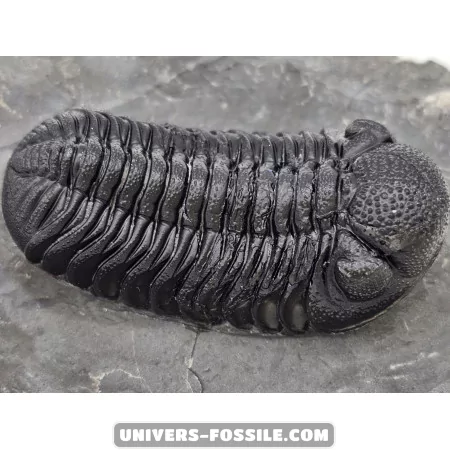Phacops Trilobites - Fossils from the Devonian Period | Trilobites

Phacops Trilobites
Phacops trilobites are a fascinating species of trilobites that thrived millions of years ago. Belonging to the class of arthropods, these prehistoric creatures are living fossils that have captivated the imagination of paleontologists and natural science enthusiasts.
Origin and Evolution
Phacops trilobites lived during the Paleozoic era, approximately 400 to 450 million years ago. They were widespread in the shallow seas that covered much of the Earth during that time. Their segmented body and hard exoskeleton helped them survive and thrive in a variety of marine habitats.
Anatomy
Phacops trilobites are characterized by their segmented external exoskeleton, which is divided into three distinct lobes. They also possessed large compound eyes, which were likely used to spot prey and detect predators in their environment. Their segmented appendages allowed them to move with agility on the seafloor.
Habitat and Lifestyle
Phacops trilobites were benthic creatures, meaning they primarily lived on the seafloor. They likely fed on organic debris and small organisms they found in the marine substrate. Their ability to move quickly allowed them to evade predators and navigate their underwater world with finesse.
Phacops Trilobites - Fossils from the Devonian Period
Trilobites are ancient marine arthropods that roamed the seas millions of years ago, and among them, the Phacops trilobites stand out as fascinating creatures. Fossils of Phacops trilobites can be found in various regions worldwide, particularly in North America and Europe.
These prehistoric creatures lived during the Devonian period, a geological era spanning from 419 to 358 million years ago. Their fossils, preserved in sedimentary layers, offer valuable insights into the biodiversity and evolution of ancient marine ecosystems.
The study of Phacops trilobites continues to captivate paleontologists and enthusiasts alike, shedding light on the intricate details of prehistoric marine life. Their complex anatomy and intriguing lifestyle provide a glimpse into the ancient seas that once teemed with diverse organisms.
The significance of Phacops trilobites in understanding our geological past cannot be overstated. Through the examination of their fossils, researchers gain a better understanding of the history of our planet and the changes that have occurred over millions of years.
In conclusion, Phacops trilobites remain a subject of enduring fascination for those intrigued by the mysteries of the ancient world. Whether it's their unique anatomy, their role in the ecosystem, or their contribution to our knowledge of the past, these creatures continue to spark curiosity and inspire discoveries in the field of paleontology.
